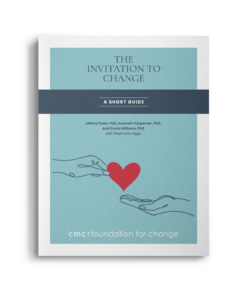Start a Community Group
What is an ITC Community Group?
ITC Community Groups are designed for people who care about someone struggling with substance use and want to help. They are a space to share the difficult or painful experiences that often come along with caring, while learning and practicing ITC skills that give members effective skills to use in their helping role. We have created an ITC Groups curriculum that includes tools for understanding, communicating, and creating an environment that is supportive of change—all while making time for practice and self-compassion for group members.
Why should I start a group?
Most communities have very limited free support groups for friends and family of those struggling with substance use disorders, and if they do, the only option tends to be Al-Anon—a 12-step group based on the disease model of addiction. While Al-Anon is helpful to many, it does not offer evidence-based strategies for helping a loved one struggling with substances. Our goal is to have ITC groups in communities across the country to provide an alternative to Al-Anon. If you bring an ITC group to your community, it is likely to be one of the only sources of evidence-based learning and support for substance use—that’s a big deal!
How do I start a group?
Both professionals and community members are invited to start their own ITC groups after completing both our 17-Hour Professional Training and our Level 1 ITC Training protocol (view our Upcoming Workshops page to find training dates).
Those who complete this protocol will gain access to twice-monthly check-ins with CMC:FFC trainers, join a community of other professionals and family members who are spreading the ITC, and receive a 15-session curriculum to guide their group meetings.
What does the ITC Groups Curriculum include?
- We offer a complete, 15-session curriculum that anyone can use to lead a peer group in the Invitation to Change Approach.
- Our sample curriculum can be used as is or adapted to your needs—it has built-in flexibility for you to adjust the length, frequency, and number of sessions, and you can combine it with other approaches (i.e. SMART Recovery) or add your own spin.
- Each topic-focused session includes a sample meeting agenda, an introductory reading on an ITC topic, and a worksheet or group exercise.
- We also offer access to our resource library, which includes sample group rules, meditations, flyers, and other useful materials for starting and running community groups.
- You will receive access to online portals with resources for you and your group members
- You will gain access to our digital surveys, which are managed by CMC:FFC research assistants. If you help us collect anonymous feedback from your members, our team will provide you with outcomes to help you gain insight on how your group members are benefiting from the group.
- You will be able to attend twice-monthly virtual meetings to connect with other group leaders, including those you completed your Certification training with.
Data Collection & ITC Community Groups:
Collecting data on the effectiveness of our programs is an integral part of our organization’s mission. Currently, we are in the process of collecting data on ITC community groups. We are looking to assess:
- Whether groups are an effective way for people to learn the ITC approach
- If groups successfully offer support, connection, and hope for attendees
- Impact on the group leaders themselves
We have a few different hopes for this data. For one thing, we want group leaders to see the impact they are having on their communities and the progress their attendees have made. We also want to build a body of research on the acceptability of the Invitation to Change as a form of peer-support (see our first research study here). Lastly, we can use this data to create more backing for evidence-based community support—both for our group leaders (who have used this data to pursue funding for their groups), for the CMC:FFC, and in the culture at large!
If you are interested in helping us with this research, let us know! We are looking for both groups that directly use the ITC curriculum as well as groups that incorporate the ITC into other approaches—we would love to work with you to collect data in a way that works for both you and your group members. Contact Elliot Foote, our Program Manager at [email protected].
